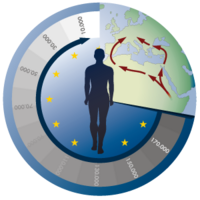Argumentation
According to the National Educational Standards for the subject of geography, communication and argumentation skills should be taught in geography lessons. Among other things, this can strengthen students' understanding of complex geographical contexts and their individual opinions. The research group of Prof. Dr. Budke is therefore engaged in the theoretical modelling and empirical assessment of communication and argumentation skills. Current and completed research projects in this field can be found here.
Publications and links:
Budke, Alexandra; Kuckuck, Miriam; Meyer, Michael; Schäbitz, Frank; Schlüter, Kirsten und Weiss, Günther (Hrsg.) (2015): Fachlich argumentieren lernen. Didaktische Forschungen zur Argumentation in den Unterrichtsfächern. Waxmann: Münster. http://www.pedocs.de/volltexte/2017/14021/pdf/Budke_et_al_2015_Fachlich_argumentieren_lernen.pdf
Budke, Alexandra; Kuckuck, Miriam und Schäbitz, Frank (2015): Argumentationsbewertungsbögen und Lautes Denken - Erhebung der geographischen Argumentationsrezeptionskompetenzen von SchülerInnen – In: Budke, Alexandra und Kuckuck, Miriam (Hrsg.): Geographiedidaktische Forschungsmethoden. Praxis Neue Kulturgeographie. Bd. 10. Berlin: Lit. S. 368-387
Budke, Alexandra (Hrsg.) (2012): Diercke - Kommunikation und Argumentation. Braunschweig.
Comparisons based on argumentation in geography classes using the example of Culture-Environment Interaction

Project participants: Marine Simon, Alexandra Budke, Frank Schäbitz
Cooperation partners: Part of the collaborative research centre 806 “Our way to Europe”
Financed by: Deutsche Forschungsgemeinschaft (DFG)
The research project focuses on the use of comparison in geography education by using topics of the CRC-806 “Our way to Europe”. To compare is a central method to get high-level conclusions out of singular observations. It is widely promoted in different school systems. However, there are hardly any contributions on the specific actual use of comparison and on a reflexive implementation of this process in geography classes. The project means to approach these questions by categorising typical forms of comparisons through an international textbook analysis, by testing school material using results from the CRC-806, and by developing guidelines to foster pupils’ comparative and argumentative skills.
Publications and links:
Wilcke, H., & Budke, A. (2019). Comparison as a Method for Geography Education. Education Sciences, 9(3), 225. https://doi.org/10.3390/educsci9030225
CRC-806 “Our way to Europe”: https://crc806db.uni-koeln.de/start/
Simon, Marine, Budke, Alexandra und Schäbitz, Frank (2020): The objectives and uses of comparisons in geography textbooks: results of an international comparative analysis. In: Heliyon 6, Issue 8, p. 1-13. [hier einsehen]
Simon, Marine, Budke, Alexandra (2020): How Geography Textbook Tasks Promote Comparison Competency—An International Analysis. In: Sustainability, 12, 8344, p. 1-19. [hier einsehen]
Budke, Alexandra und Simon, Marine (2021): Förderung von Argumentationskompetenzen durch Vergleiche? Analyse von Vergleichsaufgaben in deutschen, britischen und französischen Geographie-schulbüchern. In: Schicker, Stephan und Schmölzer-Eibinger (Hrsg.): ar/gu/men/tie/ren. Weinheim. S. 170-185.
Multi-perspectivity in geography education
Project participants: Dina Vasiljuk, Alexandra Budke
Time period: Start 2019
Multi-perspectivity is an important teaching principle in order to counteract the monocausal view of a fact and thus to be able to form a differentiated judgement. Different points of view have to be understood and different opinions have to be held. Especially the ability to change perspectives is a possibility to understand and question one's own as well as other perspectives. Especially the topics dealt with in geography lessons, which deal with conflicts of various kinds and their respective actors, are suitable for an implementation of the change of perspective with students. Therefore, on the one hand it is examined what is meant by perspective change in geographical didactic school media and on the other hand how this can be implemented in the classroom.
Publications
Vasilijuk, Dina und Budke, Alexandra (2021): Multiperspectivity as a Process of Understanding and Reflection: Introduction to a Model for Perspective-Taking in Geography Education. In: European Journal of Investigation in Health, Psychology and Education. 11. S. 529-545. [hier einsehen]
Vasiljuk, D. / Budke, A. (2021a): Akteure im Rahmen des Perspektivenwechsels: Ergebnisse einer Analyse von geographiedidaktischen Unterrichtsmaterialien. In: GW-Unterricht Heft 2, S. 18-30.
Completed projects
Planning in geography lessons
Project participants: Veit Maier, Alexandra Budke
Time period: completed in 2018
Conflicts over land use and related planning solutions are publicly discussed in democratic societies worldwide. In order to participate constructively in this debate, future generations must acquire specific factual knowledge and acquire various skills. The project investigated how spatial planning is treated in geography textbooks, how it is carried out by pupils in the classroom, how it is understood by prospective geography teachers and what conclusions can be drawn from this.
Publications:
Maier, V. (2018): „Das alles und noch viel mehr...“ Untersuchungen von Planungsaufgaben aus Geographieschulbüchern, dem Planungsprozess von Schüler*innen im Geographieunterricht und dem Verständnis von angehenden Geographielehrer*innen bezüglich des räumlichen Planens. Dissertation. Köln: Universität zu Köln. https://kups.ub.uni-koeln.de/id/eprint/8461
Maier, Veit und Budke, Alexandra (2016): The Use of Planning in English and German (NRW) Geography School Books. In: RIGEO (6) 1, S. 8-31. http://rigeo.org/rigeo-v6-n1-1/
Maier, Veit und Budke, Alexandra (2016): Politische Bildung durch Planungsaufgaben – Ein Vergleich deutscher und britischer Geographieschulbücher. In: Budke, Alexandra und Kuckuck, Miriam (Hrsg.; 2016): Politische Bildung im Geographieunterricht. Stuttgart. S. 187-197.
Maier, Veit und Budke, Alexandra (2017): Internationalization of Teacher education: A case study of dutch and german geography students´understanding of spatial planning. In: European Journal of Geography Volume 8, Number 5, S. 43 – 61. http://www.eurogeographyjournal.eu/articles/INTERNATIONALIZATION%20OF%20TEACHER%20EDUCATION(43-61).pdf
Maier, Veit und Budke, Alexandra (2018): Wie planen Schüler/innen? Die Bedeutung der Argumentation bei der Lösung von räumlichen Planungsaufgaben. In: GW-Unterricht. Bd. 149. S. 16-29 http://www.gw-unterricht.at/index.php/onlineausgaben/19-2017/60-149-2018.html
Implementation of argumentation in geography lessons in Vietnam
Project participants: Than Tam Nguyen, Alexandra Budke
Time period: completed in 2018
The empirical work focuses on the importance and integration of argumentation skills in geography lessons in Vietnam. This is investigated by analyzing Vietnamese geography textbooks, by analyzing the perception and attitude of Vietnamese geography teachers with regard to the treatment of argumentation, and by analyzing the argumentation skills of Vietnamese geography students.
Publication:
Nguyen, Thanh Tam (2018). Implementation of Argumentation in Geography Lessons in Vietnam – an Analysis of Geography Schoolbook Tasks, Teachers’ Perceptions and Quality of Pupils’ Written Argumentation. Dissertation, Universität zu Köln. https://kups.ub.uni-koeln.de/8462/
Argumentation as a method for problem-solving
Project participants: Sabrina Dittrich, Alexandra Budke
Cooperation partner: Collaborative research centre 806 "Our way to Europe"
Financed by: DFG
Time period: completed in 2017
Problem solving is one of the key competences to be promoted in the classroom. Geography lessons are particularly suitable for this purpose. It is assumed that argumentation is a method for problem solving. Because of the apparent relationship between problem solving and argumentation, the aim of this paper is to explore this relationship. It was shown how the process of problem solving takes place, what role agrumentation plays in problem solving, and what characteristics distinguish strong argumentation.
Publication:
Dittrich, Sabrina (2017): Argumentieren als Methode zur Problemlösung: Eine Unterrichtsstudie zur mündlichen Argumentation von Schülerinnen und Schülern in kooperativen Settings im Geographieunterricht. Dissertation, Universität zu Köln. https://kups.ub.uni-koeln.de/7548/
Exploring complex human-environment systems in geography lessons with the help of argumentation
Project participants: Beatrice Müller, Alexandra Budke
Time period: completed in 2016
Using the theoretical concept of complex human-environmental systems, the drinking water problem is analysed using the nascent megacity Guadalajara (Mexico) as an example. Human-environment relationships are an essential subject of modern geography didactics and teaching. In this work, models are developed that can serve as measuring instruments for the representation of complex systems in student texts.
Publications:
Müller, Beatrice (2016). Komplexe Mensch-Umwelt-Systeme im Geographieunterricht mit Hilfe von Argumentationen erschließen - am Beispiel der Trinkwasserproblematik in Guadalajara (Mexiko). Dissertation, Universität zu Köln. https://kups.ub.uni-koeln.de/id/eprint/7047
Budke, Alexandra und Müller, Beatrice (2015): Nutzungskonflikte am Rhein als komplexe Mensch-Umwelt-Systeme mit Hilfe von Argumentationen erschließen. In: Gryl, Inga, Kanwischer, Detlef und Schlottmann, Antje (Hrsg): Mensch:Umwelt:System. LIT: Berlin. S. 177-189.
Spatial conflicts - understanding of social discourses through argumentation in geography lessons
Project participants: Miriam Kuckuck, Alexandra Budke
Time period: completed in 2014
Spatial conflicts are produced on a daily basis by, among other things, the argumentation of actors and the discourse about it. Pupils should deconstruct conflicts with the help of language and be enabled to argue their own opinions. In this research project, the criteria used by students to evaluate the reception of actors' opinions in spatial conflicts was investigated with the help of the method of thinking aloud. Furthermore, the existing competence model according to Budke et al. (2010) was reviewed.
Publikation:
Kuckuck, Miriam (2014): Konflikte im Raum - Verständnis von gesellschaftlichen Diskursen durch Argumentation im Geographieunterricht. Monsenstein und Vannerdat. hgd; ISBN 978-3-95645-279-6
